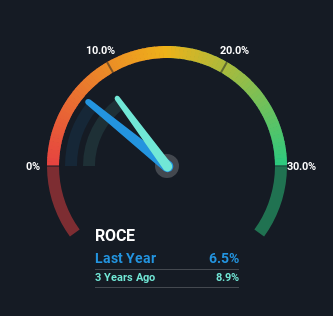- South Korea
- /
- Machinery
- /
- KOSDAQ:A016920
There Are Reasons To Feel Uneasy About CAS' (KOSDAQ:016920) Returns On Capital

If you're looking for a multi-bagger, there's a few things to keep an eye out for. Firstly, we'd want to identify a growing return on capital employed (ROCE) and then alongside that, an ever-increasing base of capital employed. Put simply, these types of businesses are compounding machines, meaning they are continually reinvesting their earnings at ever-higher rates of return. However, after investigating CAS (KOSDAQ:016920), we don't think it's current trends fit the mold of a multi-bagger.
Return On Capital Employed (ROCE): What Is It?
For those who don't know, ROCE is a measure of a company's yearly pre-tax profit (its return), relative to the capital employed in the business. To calculate this metric for CAS, this is the formula:
Return on Capital Employed = Earnings Before Interest and Tax (EBIT) ÷ (Total Assets - Current Liabilities)
0.065 = ₩5.0b ÷ (₩163b - ₩86b) (Based on the trailing twelve months to September 2024).
So, CAS has an ROCE of 6.5%. In absolute terms, that's a low return but it's around the Machinery industry average of 6.5%.
Check out our latest analysis for CAS

Historical performance is a great place to start when researching a stock so above you can see the gauge for CAS' ROCE against it's prior returns. If you'd like to look at how CAS has performed in the past in other metrics, you can view this free graph of CAS' past earnings, revenue and cash flow.
What Does the ROCE Trend For CAS Tell Us?
On the surface, the trend of ROCE at CAS doesn't inspire confidence. Around five years ago the returns on capital were 10%, but since then they've fallen to 6.5%. However it looks like CAS might be reinvesting for long term growth because while capital employed has increased, the company's sales haven't changed much in the last 12 months. It's worth keeping an eye on the company's earnings from here on to see if these investments do end up contributing to the bottom line.
On a separate but related note, it's important to know that CAS has a current liabilities to total assets ratio of 53%, which we'd consider pretty high. This can bring about some risks because the company is basically operating with a rather large reliance on its suppliers or other sorts of short-term creditors. While it's not necessarily a bad thing, it can be beneficial if this ratio is lower.
In Conclusion...
To conclude, we've found that CAS is reinvesting in the business, but returns have been falling. Additionally, the stock's total return to shareholders over the last five years has been flat, which isn't too surprising. Therefore based on the analysis done in this article, we don't think CAS has the makings of a multi-bagger.
On a final note, we found 3 warning signs for CAS (1 is potentially serious) you should be aware of.
If you want to search for solid companies with great earnings, check out this free list of companies with good balance sheets and impressive returns on equity.
New: AI Stock Screener & Alerts
Our new AI Stock Screener scans the market every day to uncover opportunities.
• Dividend Powerhouses (3%+ Yield)
• Undervalued Small Caps with Insider Buying
• High growth Tech and AI Companies
Or build your own from over 50 metrics.
Have feedback on this article? Concerned about the content? Get in touch with us directly. Alternatively, email editorial-team (at) simplywallst.com.
This article by Simply Wall St is general in nature. We provide commentary based on historical data and analyst forecasts only using an unbiased methodology and our articles are not intended to be financial advice. It does not constitute a recommendation to buy or sell any stock, and does not take account of your objectives, or your financial situation. We aim to bring you long-term focused analysis driven by fundamental data. Note that our analysis may not factor in the latest price-sensitive company announcements or qualitative material. Simply Wall St has no position in any stocks mentioned.
About KOSDAQ:A016920
Low with questionable track record.
Similar Companies
Market Insights
Community Narratives



